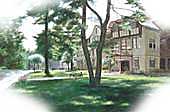Fall
1983
Coming to Know Him
Sergio Valori
Pastor
There is an abundance of teaching given on Jesus Christ in
the earth today more so than ever before. Yet, there is a
scarcity of the number of people who truly know Him. We so
need to have a knowledge of the ways of God, for this guides
us on a path to knowing Him.
Let us take a close look at the early spiritual walk of Saul
in 1 Samuel, chapters nine and ten. We think of Saul as the
man who missed God, and he clearly did miss God’s best
for his life, due to his own disobedience and hardening of
heart. However, as we read these chapters, we can learn much
as to the ways of God in His apprehension upon our own lives.
In reference to Saul, God chose him to rule over Israel, for
these people were demanding a king. Although God desired that
they be content to have Himself as their king, He responded
to their cry for an earthly ruler.
In the beginning verses of chapter nine, Saul’s father
had lost his donkeys and had sent his son out after them.
We note a long search with no good result (verses 4, 5). Finally,
the servant of Saul suggests a man of God, a prophet (Samuel)
that could possibly help them. In this we see God setting
up a circumstance, a problem we can’t solve, which draws
us to Him. In verses fifteen and sixteen God told Samuel:
“Tomorrow I will send a man to you.” Here, God
created a problem. Let us face reality. Until we are beset
with needs, we don’t really turn to God. God has to
create problems we can’t solve, or He makes good use
of a situation in which He was not involved. When we turn
to Him, He’s waiting for us. He knows when we are coming.
In the scripture, Saul’s thinking was solely on the
donkeys: God had something else in mind. He is more interested
in us fellowshipping Him, than us fellowshipping our problem!
We may say we’ve already come to Jesus, but He wants
to bring us fully to Him. Thus this illustration may be repeated
over and over in our lives, with God allowing problems, or
deliberately creating them—not to show His magnificence
in how He can resolve a situation, but to draw us to Himself.
Let us stop a moment and contemplate this subject. There
is a difference between looking to God to solve our problem
and getting into fellowship with Him as a person; and we can
miss as Saul did. It is one thing to bring God into our lives
so that we can be blessed or be more comfortable, but God
is concerned about altering our lives—transforming us—elevating
us up into Him. We can live in a much lower plane than God
has destined us to live. God is not a hard, calloused God
who is not interested in our needs. He knows and is moved
with compassion. But God wants to raise us and get us taken
up with His eternal purposes. These circumstances He uses
as His drawing power to get us to fellowship Him. If everything
went smoothly, we would fall short of pressing into the kingdom
of God.
In chapter nine, verse nineteen, Samuel tells Saul to come
and eat with him (fellowship him) as our Lord is calling us
to do likewise with Him as a person. In verse twenty, Samuel
assures Saul the donkeys are found! “Seek ye first the
Kingdom of God and all these things (the donkeys) will be
added unto you.”
Before continuing in the story, let us look at the different
realms symbolized in the tabernacle of the Old Testament,
for they are clearly defined. The outer court is where our
needs are met: a blessing realm. In that place, God is known
for what He can do for us. The Holy Place is the place of
service, where we can become so occupied in working for Him
that we never come to know Him. The Holy of Holies is where
the person of God comes down off the Mercy Seat and communes
with the priest face-to-face. When Jesus rent the veil for
us, He opened the way for us to come and meet our God as did
the priest of old.
Continuing in the scripture, we see in 1 Samuel 9:22 that
Samuel took Saul into the parlor and gave him a special place
to sit. There is that inner place where we can sit and come
to hear the voice of God. If you are sensing the drawing power
of God on our life, you are a blessed person. We must set
our own burdens aside and come into His presence, for there
is a special portion reserved for each of us, if we will respond
to His call (1 Sam. 9:24). The shoulder portion was reserved
for the priest, and this special portion was being presented
before Saul. We tend to drift into aimlessness, and it often
takes a special crisis to awaken us to the special purpose
God has for each one of us.
Then Samuel bids Saul, “Stand thou still awhile, that
I may shew thee the word of God” (1 Sam. 9:27). In other
words, be stilled before the Lord, and lay aside our busy,
natural life and even our ministry, that He can bring us into
a new relationship with Him—one we have never before
known.
1 Samuel, chapter ten, begins with Samuel taking a vial of
oil and anointing Saul. Now comes the revelation of his calling:
called to the throne of Israel to be king. In 1 Corinthians
6:2-3 Paul is correcting and exhorting God’s people,
when he found one brother taking another to court. He chastised
them for such actions: for not being able to judge the smallest
matters, when our calling is to judge nations and angels.
It is a knowledge of who we are that causes us to rightly
live and behave. Every bit of territory in our lives has to
be conquered by Jesus Christ. Our lives have to be above reproach,
where the devil can find no ground to accuse us. Emphasis
in the kingdom of God is on character: he that doeth the will
of the Father. There is order and government and purity in
His kingdom; and we need to be clothed with his nature, and
are being groomed for a place to rule and reign with Him.
Verse six reads, “And the Spirit of the Lord will come
upon thee and thou shalt prophesy with them, and shalt be
turned into another man.” Verse nine says, “And
it was so, that when he had turned his back to go from Samuel,
God gave him another heart.” As Saul was anointed into
God’s purposes and he clearly heard the call and received
it all, he became a new person—God’s man—with
a new heart toward God. This singular experience turned and
changed this man, although he later hardened that heart. Yet,
this has great symbolism for us; for as we are open to God,
and these turnings take place in our lives, we are changed
from glory to glory.
There is still another thought in relation to Saul’s
turning experience. In Ezekiel 11:19-20 God promises for His
remnant, “I will give them one heart, and I will put
a new spirit within you: and I will take the stony heart out
of their flesh, and will give them an heart of flesh: that
they may walk in my statues and keep mine ordinances, and
do them: and they shall be my people, and I will be their
God.” God is interested in changing us into another
man. It is a turning point that permanently alters us; where
the Spirit reigns supreme and we are led by the Spirit of
God, ruled by His guidance and moved by His word. God not
only wants to cleanse our inner man of carnality, but give
us a new heart that is full of the glory and knowledge of
God.
The father desires that we might be lifted up out of the
narrowness of self and our little problems, for He is looking
for a vast family of sons to fill the earth with a people
conformed to His likeness. This is the glory of God on the
earth as the waters cover the sea; this is the new birth of
a dying world.


